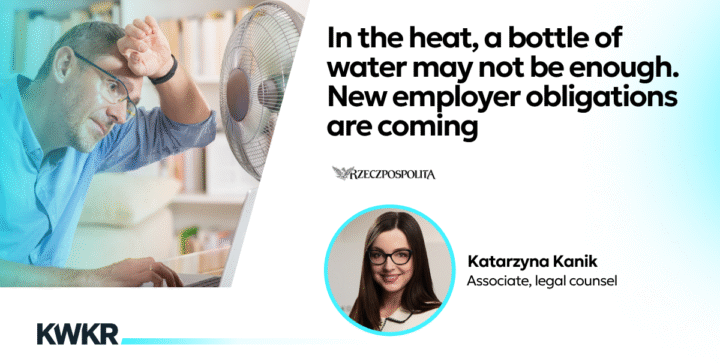Katarzyna Kanik for Rzeczpospolita: “In the heat, a bottle of water may not be enough. New employer obligations are coming”
Rising summer temperatures affect employees’ well-being and performance and, in extreme cases, can pose a real threat to their health. As a result, employers are subject to obligations under labor law that aim to ensure adequate and safe working conditions. These obligations are discussed in the daily Rzeczpospolita by associate Katarzyna Kanik. Read article in Polish here!

Under the current regulation, employers are required to provide beverages to employees working outdoors if the temperature exceeds 25°C, and to those working indoors when the temperature exceeds 28°C. These beverages must effectively replenish fluids and electrolytes lost due to sweating — a simple bottle of water may not suffice.
Employers are also obliged to provide preventive meals to employees performing physically demanding work with high energy expenditure (over 1000 kcal for women and 1500 kcal for men). For indoor work in temperatures above 25°C, meals should provide around 1000 kcal. The regulations explicitly prohibit replacing meals with a cash equivalent — the employer must actually provide access to appropriate food and beverages.
Legislative work is currently underway on amendments to regulations concerning workplace temperatures. The planned changes, scheduled to come into force on 1 January 2026, will introduce maximum temperature limits:
- 28°C for work involving low or moderate metabolic rate,
- 25°C for high metabolic rate,
- 22°C for very high metabolic rate.
If the temperature exceeds 35°C despite the use of appropriate technical measures, the proposed regulations will ban the performance of work.
Rising temperatures are not just an inconvenience — they represent a genuine health risk that labor law must address. The responsibility for ensuring safe working conditions lies with the employer, who should monitor regulatory changes and implement them accordingly.
When must employers provide drinks to employees, and what kind of beverages are required? In which situations are preventive meals necessary? What regulatory changes are planned regarding maximum workplace temperatures?
These and many other questions are answered in Katarzyna Kanik’s article published in Rzeczpospolita.
